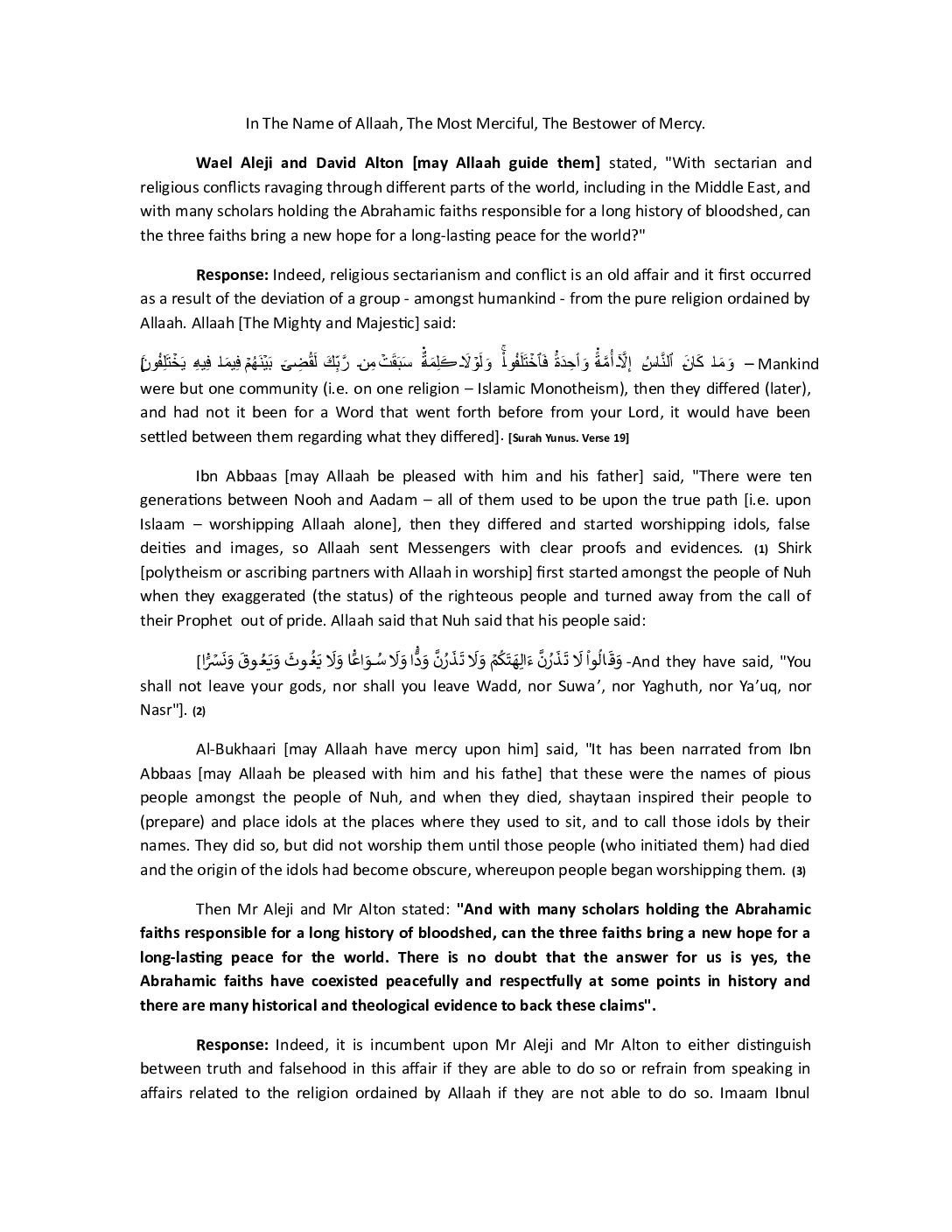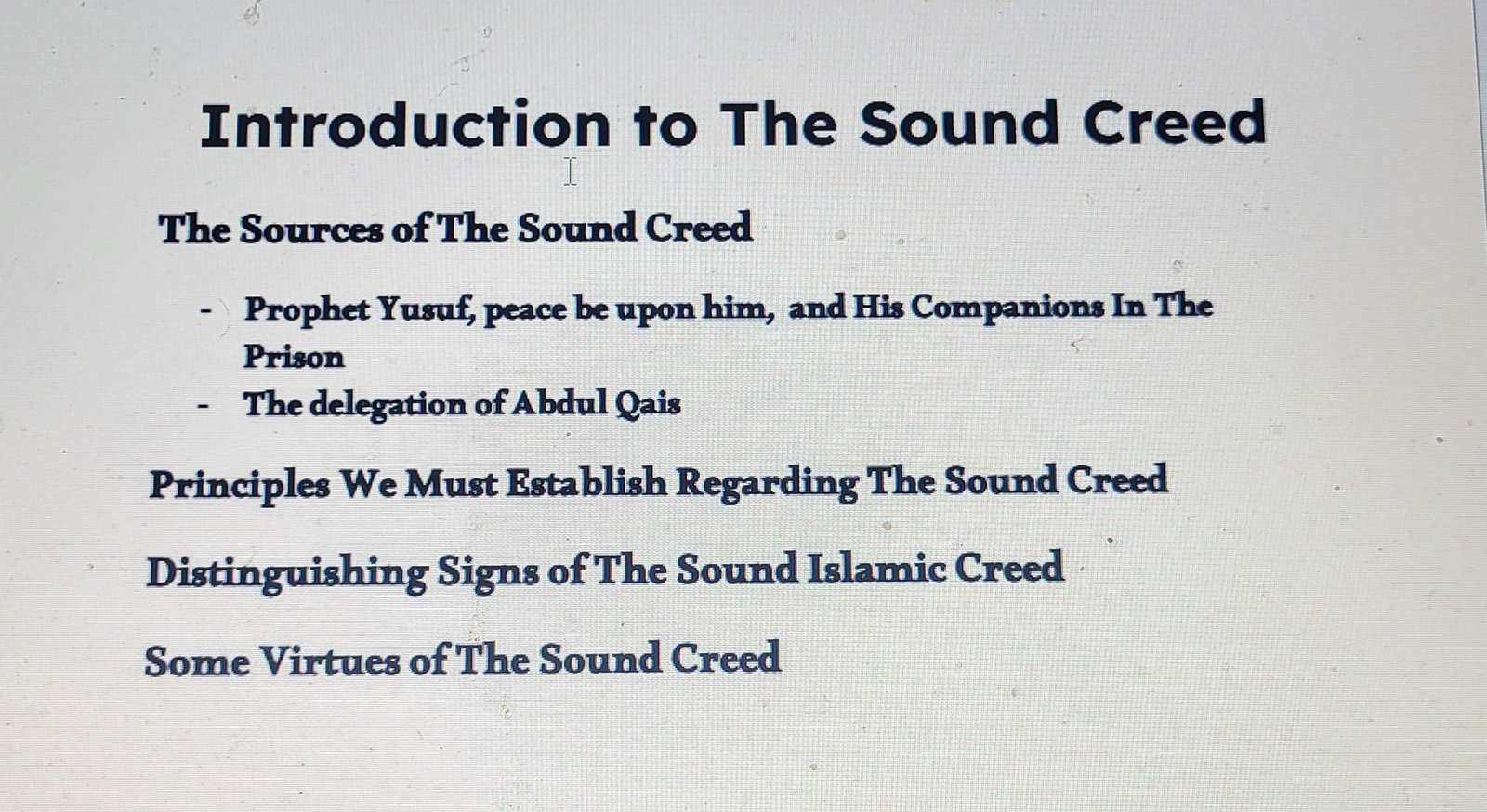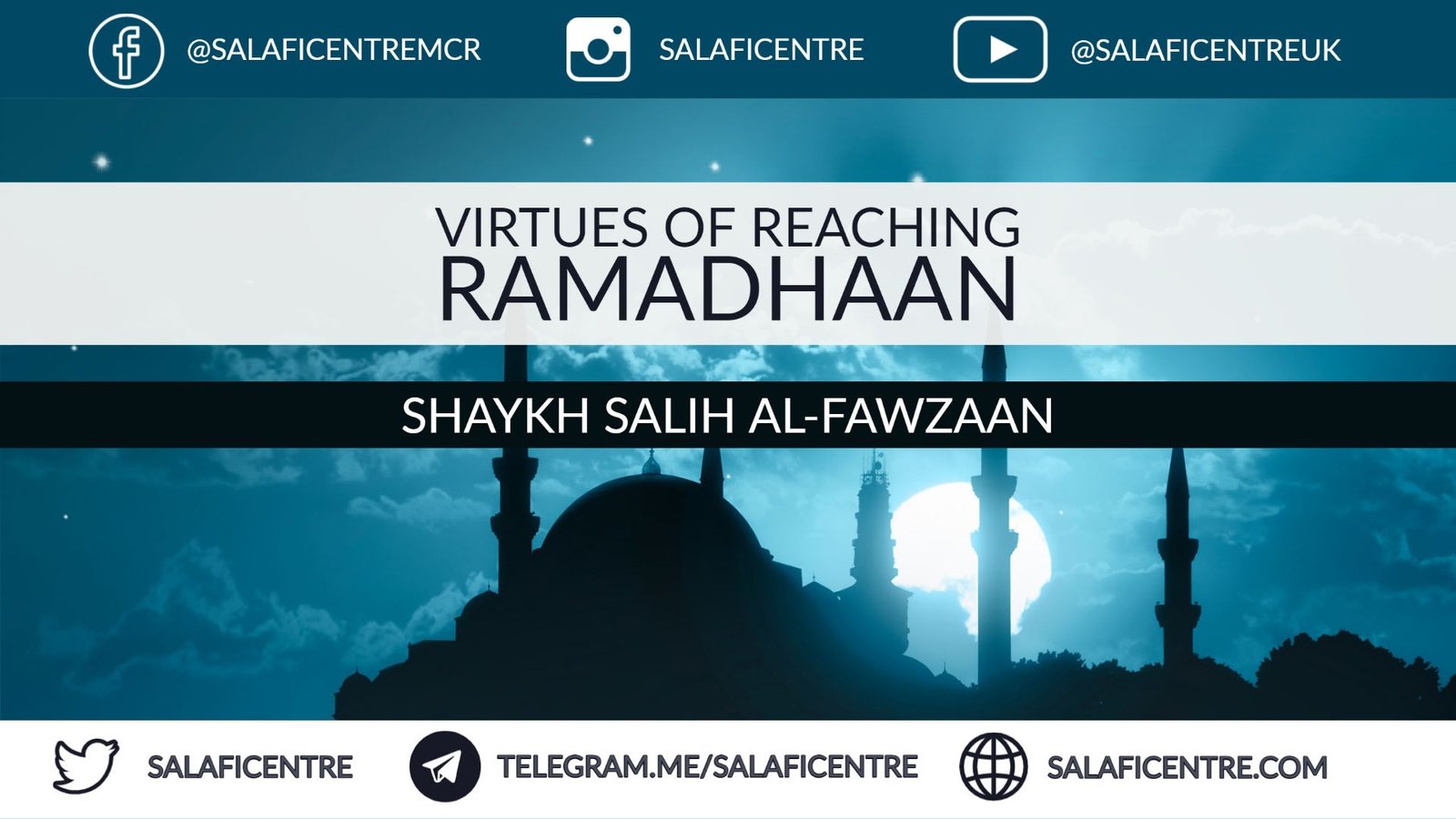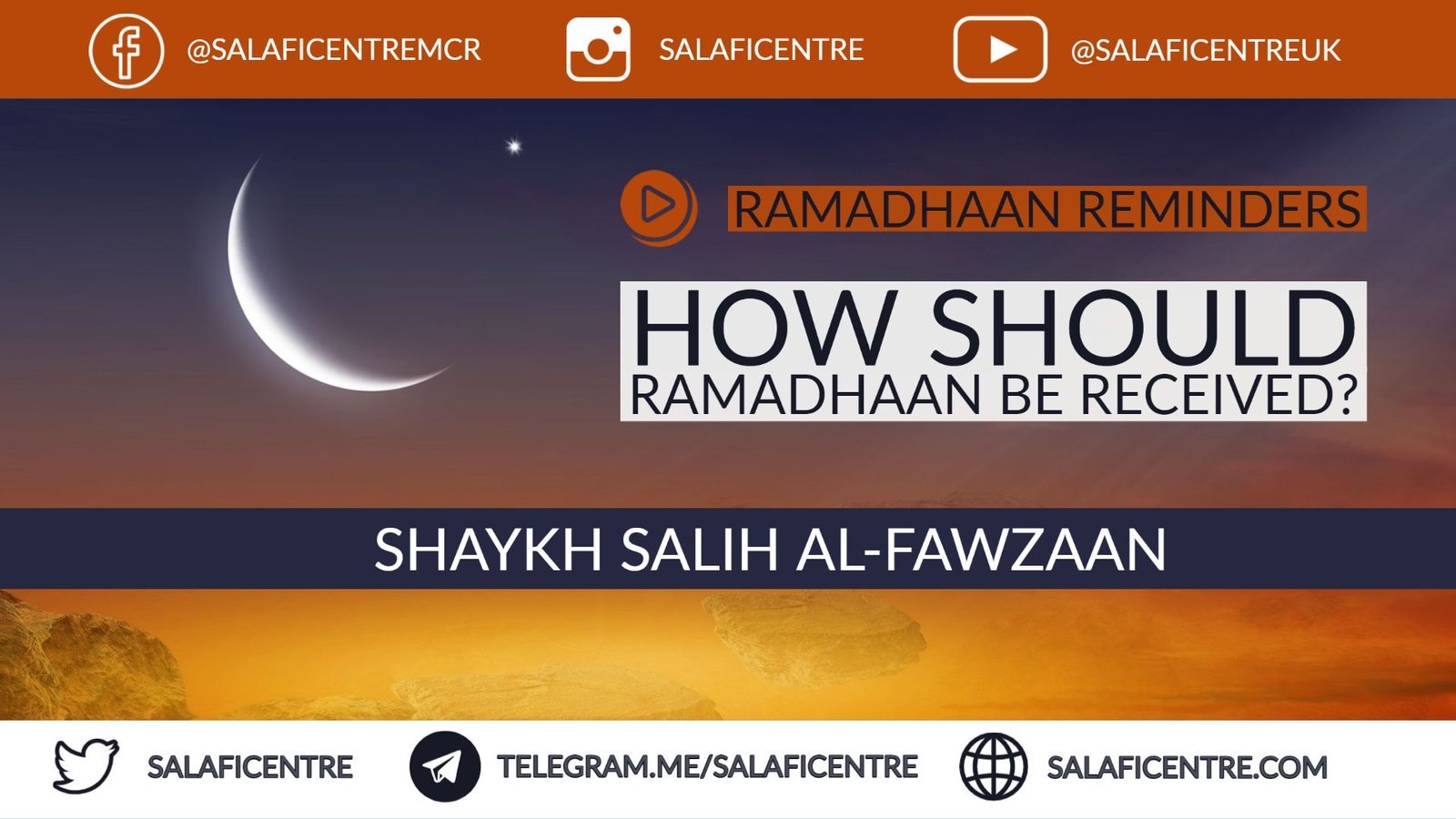In The Name of Allaah, The Most Merciful, The Bestower of Mercy
On 01/04/2003, Ustaadh Abdul Waahid [Abu Khadeejah (hafidha-hullaah)] wrote:
As for the point concerning Shaykh Abdul-Muhsin al-Abbaad, hafidhahullaah, then the following important comments can be made as well as important principles established
1. The Shaykh is scholar of the Sunnah and Salafiyyah. An individual who has strived for many years teaching the Sunnah of our Messenger, ‘alayhi salaatu was-salaam, to the Ummah. We make du’aa for him and speak only good of him as do the rest of the Scholars.
2.That we recognise that that there is no individual in this Ummah, other than the Messenger of Allaah, ‘alayhi salaatu was-salaam, that can encompass every aspect of completion in every field of knowledge that Allaah has revealed. Bearing this in mind, any individual can err. The less knowledge you have of the legislation, the more you err. The more shar’ee knowledge you have, the less you err. The Messenger of Allaah, ‘alayhi salaatu was-salaam, mentioned in a hadeeth, “Idhaa hakama Haakimu, fajtahada, fa asaaba falahu ajraan. Wa idha hakama fa akhta’a, falahu ajrun waahid” – meaning – “When a judge makes a judgement and he makes ijtihaad and he is correct, he gets two rewards. And if he judges and is incorrect, he receives a single reward” (Hadeeth of Abu Hurayrah reported by Bukhaaree and Muslim).And these rewards are for the ‘ulemah of Ahlus-Sunnah
3.As for the statement, “Every Mujtahid is correct” (Kullu mujtahid museeb), then the Qaadi Abu Tayyib At-Tabaree said: “[as for the statement], ‘every mujtahid is correct’, then this is madhhab of the mu’tazilah of Basrah, and they are the root of this bid’ah.” (see Bahrul-Muheet 6/243)
4. The truth is one as Imaam Maalik stated with regard to the Sahaabah, radhi Allaahu ‘anhum: “There is not in the differing of the Sahaabah an allowance/excuse (for others). Indeed there is only that which is wrong or right” (Jaami’ Bayaanil-‘Ilm wal-Fadlihi). And we have been ordered with that which is right and correct. And this is in agreement with the statement of Ibn Abbaas, radhi Allaahu ‘anhu, said: “I say: ‘The Messenger said’ and you say: ‘[But] Abu Bakr and Umar said’!”
5. Differring of the scholars is not a proof. Al-Haafidh Abu ‘Umar Ibn Abdil-Barr said: “Difference of opinion is not a proof with a single one of the fuqahaa of the Ummah, except for the one who has no insight and possesses no knowledge – and he has no proof for his speech.” (Jaami’ Bayaanil-‘Ilm).
6. Clarifying the errors is an obligation. Al-Haafidh Ibn Rajab, rahimahullaah, said: “And from the headings of naseehah to Allaah, the Most High, and His Book and His Messenger – and this is particular to the Scholars – to refute the deviations from the Book and Sunnah… And likewise to refute the weak statements from the slips of the scholars and to make clear the proofs of the Book and Sunnah.” (Jaami’ ul-‘Uloom wal-Hikam, abridged)
7. Excusing Deviation and Bid’ah is not an option if one knows. Shaykhul-Islaam Ibn Taymiyyah (d. 728H) said: “And another group, [then] they do not know the ‘aqeedah of Ahlus-Sunnah wal-Jamaa’ah as is obligated, or they know a part of it and are ignorant regarding a part of it – and that which they know, they conceal and do not explain it to the people – and they do not forbid the bid’ah and they do not censure Ahlul-Bid’ah nor punish or subdue them. Rather they may even have disparaging remarks with respect to the Sunnah and the foundations of the Deen – not distinguishing between the speech of Ahlus-Sunnah and that of Ahlul-Bid’ah wal-Furqah – Or they accept the different madhhabs of bid’ah just as the ‘ulemah excuse each other in the issues of ijtihaad in which there is [genuine] difference. And this is the condition of many of the murji’ah, and some of the Thinkers, the Soofees and the Philosophers” (Majmoo’ al-Fataawa Vol 12, slightly abridged).
As can be seen, that if a person knows the reality of an issue, then he is not excused thereafter in supporting that which is opposition to the Sunnah after the matter is made clear from the texts of the Book and Sunnah upon the Manhaj of the Salaf. As for the one who does not know, then he is informed so that he takes the correct position against those who oppose Ahlus-Sunnah and its principles and fundamentals.
As for Ash-Shaykh Abdul-Muhsin al-Abbaad, hafidhahullaah, then we say that he recognised some of the errors of Abul-Hasan Al-Misree Al-Ma’rabee, the innovator, and this has been mentioned by him and confirmed by Ash-Shaykh Rabee’ bin Haadee, hafidhahullaah, in his last visit to Madeenah. But the affair is still not completely clear to him so that is why, as it seems he has not taken a stronger open stance against Al-Ma’rabee. It is not upon us now to start questioning the Jarh Mufassar of the other Scholars due to the apparent silence of another on Abul-Hasan Al-Ma’rabee. This is because the principle ‘the detailed jarh takes precedence of the ta’deel’ stands firm throughout time due to the fact that the one who brings this jarh mufassar is more knowledgeable of the affair of an individual (in this case of Al-Ma’rabee) than the one who just brings a general ta’deel. And the one who has knowledge is a proof over the one who does not know.
So one should not feel confused or disillusioned due to not finding ijmaa’ (consensus) in the jarh of an individual. Since ijmaa’ is not a pre-condition for accepting a jarh. Rather the guiding factor is the bringing forth of a detailed refutation, clear and mufassal by one who is capable and this takes precedence over the ta’deel mujmal (general praise). And of-course those scholars who have refuted Abul-Hasan are from the kibaar in the field of Jarh wa Ta’deel – and they have written to-date thousands of pages upon this innovator Abul-Hasan Al-Misree. Yet not one of the scholars, whom the supporters of Abul-Hasan try to rally around has brought a single detailed reply to the many, many refutations upon Abul-Hasan.
So we say, that the Shaykh Abdul-Muhsin, hafidhahullaah, is as Shaykh Rabee’ himself stated: That Shaykh Abdul-Muhsin is not more knowledgeable about Abul-Hasan than Shaykh Rabee’.
Alongside we know that Al-Allaamah Rabee’ is the Imaam of Jarh wa Ta’deel in our time as stated by Imaam Al-Albaanee, rahimahullaah. So he is the expert in this field recommended by another expert in the field. (1)
So we do not need to look into nor are we obligated to know why Shaykh Abdul-Muhsin, hafidhahullaah, does not make tabdee’ upon Abul-Hasan (i.e. declare him to be an innovator) and take from the other Scholars in this regard. Since we have what is sufficient by way of exposition and refutation from the other scholars upon Abul-Fitan Al-Ma’rabee.
Sufficient is it that the scholar is rewarded a single reward if he is erroneous in a particular matter. So we give him that with which we are obligated, respect and honour – we do not speak ill of him – no more than we would about any of the ‘ulemaa of the Salaf who erred in a particular matter. Rather we make du’aa for them as we have been ordered by the Creator of the Heavens and the Earth.
[end of quote from ustaadh Abdul Waahid]
Editor’s comment see link for further details on this issue so that the followers of the innovators (Maribi, Halabi and maghraawi) do not confuse you about this statement of Imaam Al-Baanee and that of other scholars: http://salaficentre.com/2012/07/jarh-wat-tadeel-continues-and-the-statement-of-imaam-albaanee-about-shaikh-rabee/









